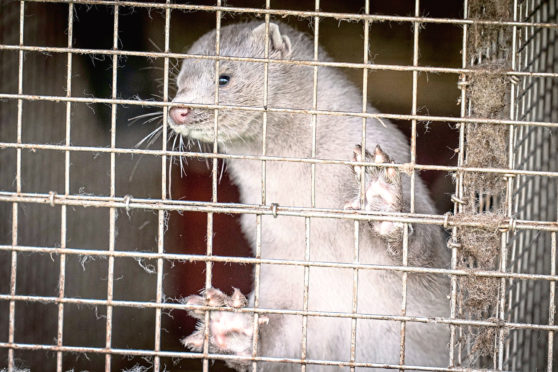
The first international coronavirus travel ban has been imposed on visitors to the UK from Denmark after a new strain of the virus was spread between minks and humans.
Fears have been growing about the mutant strain of the virus –referred to the “cluster 5” variant – linked to commercial mink farms in Denmark.
People who have been in the Scandinavian country in the last 14 days have now been banned from entering the UK – the first time such a measure has been taken since the start of the pandemic.
UK nationals and those with residency will be permitted to return home but they and their households must quarantine for 14 days.
Loganair has suspended flights between Scotland and Denmark from November 9 to 22 as a result of the announcement.
Another 39 people with coronavirus have died in Scotland, taking the total death toll to 3,036.
The number of confirmed cases rose by 1,596 to 72,328, and the rate of positive tests went up to 6.3% from 5.5%.
A total of 1,245 people are in hospital with Covid-19, and of those, 106 were being treated in intensive care.
Nicola Sturgeon had added Denmark to Scotland’s quarantine travel list on Friday but at 2am yesterday the Westminster government announced a blanket ban on non-UK citizens travelling from the country.
Writing on Twitter, transport secretary Grant Shapps said: “This decision to act quickly follows on from health authorities in Denmark reporting widespread outbreaks of coronavirus in mink farms. Keeping the UK public safe remains our top priority.”
The borders were closed to visitors from Denmark at 4am – two hours after the tweet.
A spokeswoman for the Department for Transport said: “Unlike other travel to the UK, there will be no exemptions to this quarantine policy.
“The UK Government is working closely with international partners to understand the changes in the virus that have been reported in Denmark and we are conducting a programme of further research here in the UK to inform our risk assessments.”
Millions of mink will now be slaughtered at more than 1,000 farms in Denmark in a bid to contain the spread of the mutated Covid virus.
The World Health Organisation said minks first caught the virus following exposure from infected humans.
But the strains infecting the minks, which have then been transmitted to people, may have acquired “unique combinations of mutations,” according to the WHO.
Twelve cases of people with a unique variant of the virus linked to farmed minks were reported in Denmark on Thursday.
All 12 cases had been identified in North Jutland in September, and their ages ranged from seven to 79. Eight had links to the mink farming industry.
Their symptoms, the severity of the illness and transmission among those infected appeared to be similar to the more commonly-found strains.
But the WHO said the variant had “a combination of mutations, or changes that have not been previously observed”.
Since June, there have been a total of 214 human cases in Denmark associated with the farms where mink are reared for their fur.
Professor Devi Sridhar, chair of Global Public Health at Edinburgh University, yesterday advised people: “You shouldn’t be stressed or awake at night over it but it is concerning to the public health community.”
Ian Jones, professor of virology at University of Reading, said there is no data on the mink mutation in the public domain, making it hard to assess the risk.
He said: “But the idea that the virus mutates in a new species is not surprising as it must adapt to be able to use mink receptors to enter cells and so will modify the spike protein to enable this to happen efficiently.
“The danger is that the mutated virus could then spread back into man and evade any vaccine response which would have been designed to the original, non-mutated version of the spike protein, and not the mink-adapted version.”
Six countries – Denmark, the Netherlands, Spain, Sweden, Italy and the US – have reported the virus in farmed minks to the World Organisation for Animal Health.
Passengers arriving in the UK from Germany and Sweden will also have to self-isolate for 14 days after the countries were taken off the safe travel corridor list.
The strictest travel restrictions imposed until now were before the UK lockdown in March, when people arriving from Wuhan in China were housed in isolation units in England.

Enjoy the convenience of having The Sunday Post delivered as a digital ePaper straight to your smartphone, tablet or computer.
Subscribe for only £5.49 a month and enjoy all the benefits of the printed paper as a digital replica.
Subscribe